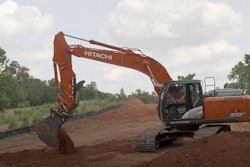Hoopaugh Grading Company has taken the unusual step of creating a training academy for its new employees that has improved retention, recruitment, safety and camaraderie.
In this episode of The Dirt, we hear from Katie Page, Hoopaugh’s director of team development, about how the HGC Academy got started and how it has helped the company. It’s taken new-employee orientation from a 30-minute sit-down talk and sending the worker into the field, to five days of training to prepare workers for what they will face on the job.
As host Bryan Furnace notes, though Hoopaugh is a large company, the ideas contractors can learn from it on training employees can fit any size contractor. You can start on a small scale in helping your new employees enter the field better prepared. Such efforts can also reduce the frustration that often leads new workers to quit because they don’t know what to do, especially young people who aren’t getting exposed to construction work as much as previous generations.
So if you’re concerned about your company’s ability to attract and keep talent, check out this latest episode of The Dirt.
Equipment World serves up weekly videos on the latest in construction equipment, work trucks and pickup trucks – everything contractors need to get their work done. Subscribe and visit us at equipmentworld.com!
In This Episode:
00:00 - Intro: HGC Academy
00:42 - Why Create a Training Academy?
01:48 - What Does the Training Academy Teach?
03:26 - Is Training Ongoing?
04:23 - Is the HGC Academy Only for HGC Employees?
04:34 - What Are the Benefits of Training Employees?
07:27 - Why Does Employee Training Increase Retention?
09:11 - Does Employee Training Help Get More Young People Involved?
10:55 - Why Training Is So Important
12:30 - What’s Next for the HGC Academy?
13:15 - Final Thoughts
Video transcript:
Bryan Furnace (00:00):
Hi, everybody. Welcome back to Equipment World. You're watching The Dirt. I'm your host Bryan, and today, we're here to talk about training again. Because what an important topic this is in the current landscape. We've got to get more people into the industry, and we're never going to do it if no one knows anything about our industry. And so, how can we, as individuals, kind of pick up the torch to help with that? Here to talk about that with us today is Katie Page with Hoopaugh Grading. They have started at training academy, and they're about two years deep into it. Let's go talk to her about some of the impacts they've seen and how it's helping their business find new employees. What made HGC decide to take on the huge monumental task of creating a training academy?
Katie Page (00:50):
When it began, no one really knew that this is what it was going to turn out to be, but Brian, our owner and president, back in 2017, he and some other teammates got together and started to develop out a 10 year strategic plan and decided that, for us to be the best that we needed to be, that we needed to be a teaching company. And the reason that that was so important or is so important to Brian is his parents worked for a company growing up that invested back in their teammates through teaching and training. So he saw the benefits of that over the course of his childhood and becoming an adult. And so, as he became owner here at Hoopaugh, he recognized the need to make sure that we had opportunities to teach and train within the company and pour back in and invest in our own people. Because that's what it's about. It's all about the people and our teammates.
Bryan Furnace (01:48):
So what does the typical onboarding process for a new employee look like? How long are you in classes? And what kind of stuff do you learn?
Katie Page (01:56):
That has grown and changed over the past few years. Initially, it started out, it was a 30 minute sit down with one of our recruiters on your first day, and you kind of got tossed the keys and said, "All right, best of luck to you." And now, today, it's a five day process. So we have orientation almost every week, and there's anywhere from, I don't know, two to 10 or 12 teammates, new teammates, in orientation. And we cover Red Cross certification. So everyone that comes through the door has been CPR and First Aid certified, need to do the MSHA certification. And we also cover soft skills and communication. We have everyone take a DISC assessment. And so, they learn about their behavioral style, more about themselves and then,, how to work with others. And then we do classroom training for how to operate equipment. And we've got some cool teaching and training tools in our warehouse.
(02:53):
We've got a 12 by 12, what we call a sandbox, with remote control equipment. So we can set up different job site scenarios and give operators an opportunity to see what a whole job site would look like and how the piece of equipment work together and set up safety scenarios, so they know how to respond and react. And then, after that week of orientation, the following week, our field operators go out, and if they need additional training, then we have field trainers on our team to go out and work with them in the field on the piece of equipment.
Bryan Furnace (03:26):
Now, is this kind of an ongoing continuing education program? Or is it kind of get the employees up to speed and then, kind of release them into the wild?
Katie Page (03:36):
So our orientation sets our new teammates up for success. It gives them that foundation that they need to get started, to feel safe. And then, we operate by the slogan, "when it rains, we train." So on rain days, we offer different types of classes. We have our three CAT simulators, so we'll have multiple people come in to train on our simulators. And then, we've got actually four training classrooms here. And we could offer anything from safety training to operator training to leadership skills. And so, we have a strategic plan in how we select those teammates that come in for those different trainings. So it's continuing education, but we've got over 700 teammates. So your continued education is staggering, if that makes sense.
Bryan Furnace (04:23):
So are you guys only servicing HGC employees currently? Are you training outside people as well?
Katie Page (04:30):
For now, HGC Academy is for HGC teammates.
Bryan Furnace (04:34):
Now outside of the obvious of kind of streamlining the onboarding process for new employees, what have been some of the biggest impacts that you guys have seen come out of the training program?
Katie Page (06:04):
I think the coolest thing, obviously, our safety has improved and our retention is gradually improving. We've only been operating for a couple years now. And so, it takes a little bit of time to see the fruits of your labor. I think some of the biggest impacts have been the camaraderie and the relationships that are built. With Hoopaugh and with other construction companies, there are crews that don't always work together. They get moved around. Oftentimes, prior to the academy, in our orientation process, you grow up on a job site and maybe not know anyone. But now, we have teammates who will see each other at the academy on rain days or maybe went through orientation together.
(06:48):
So it builds out this family feel. We're a large company, but we really have a lot of opportunity for teammates to get to know each other. So I think that's been something that we didn't anticipate happening, that has been really cool. And the other thing is it's really brought a lot of exposure in this region to this industry. There's a lot of curiosity about the academy. And then, even nationally, we've got a podcast as well. And I think that that has helped when we've spoken about the academy on the podcast. And so, it's just increased the curiosity about Hoopaugh and training efforts and opportunities within the industry.
Bryan Furnace (07:27):
Now, one thing that stuck out, especially as a contractor, and I know a lot of other contractors probably caught this, you mentioned your retention rates were going up. Any theories as to why that is having an impact on retention rates?
Katie Page (07:42):
So I really believe that, when we say it's all about the people, that's why we're doing this. Time and time again, we get asked, what's the ROI on the academy? This can't be cheap. We've got a team of 18 people that support team development group. And so, it's not a small venture, but they ask, what's the cost of the academy? It's like, what's the cost of not having the academy? What's the cost of not investing in your own teammates? And we've even gone so far as we now have, on our team development group, a curriculum and development specialist. So she helps develop out all the curriculum that we offer and make sure that it's interactive and that our teammates are able to retain the information. Because it's one thing to just sit in a classroom and just listen. It's another thing to put principles into practice.
(08:34):
We also have a career coordinator. So we've developed out career progressions, and we have someone who is helping to track that. And so, if you come in to Hoopaugh and you've got different dreams about which direction you want to go within the industry, we have somebody that will help guide you through that. And we have a community relations specialist, who connects in with other organizations in the community, schools, things like that, to help high schoolers or college students understand that there's a career within this industry. And if you come into Hoopaugh, then you'll have a long career path here.
Bryan Furnace (09:11):
Have you noticed, when you go into the high schools, not just having these students go directly into the field, but having this kind of, even if it is only a week or so, transition, does that kind of get the students engaged a little more with you guys versus "Yeah, just come get on the end of a shovel tomorrow?"
Katie Page (09:29):
For sure. For sure. And one thing that we are going to launch in 2023 is an internship program. And that is because we've had so much interest from different high schools and other organizations in the area. And so, the idea is that there is a summer internship program. So the initial year that you would come in, if you're between your junior year and senior year, you can come in for six to eight weeks. And we have a program built out, so you have exposure with our different resource groups. And then, if you come back the second year after your high school, then you've got that first year under your belt. And then, instead of just coming in as a new hire, there's a six to eight week program that really gets you into that specific path that you want to be on.
(10:16):
And so, I think that's the huge thing about recruiting into this industry. There were a lot of years where it's like, "you've got to go to college, you got to get a college degree," and the trades just weren't promoted. And I think we're seeing a turn now. And I think that having something that even parents can look at and say, "all right, here's a training program and there is a career path here and it's not a dirty job necessarily. There are really great opportunities within this industry and there's a path there," that it makes it a lot easier to recruit into Hoopaugh and into this industry.
Bryan Furnace (10:55):
That is one of my personal soap boxes that I have about our industry is, everybody is well aware of the problem that you can't find people. We don't have enough people coming into the trades. College is way, way overblown, and we're pushing everyone that route. But my big problem is there's so many people in the industry that are just kind of sitting there. "Someone needs to do something about this problem." For an industry of doers, there's sure a lot of crossed arms out there. And so, that's where it's exciting to me to see companies, like HGC, come in, where you guys, as a company, are taking the initiative to go do something for your area, for yourselves, to kind of fix the problem. It's going to take the industry really stepping up before we really see any impact, because just everyone sitting back with their arms crossed, no one's going to do it for us.
Katie Page (11:44):
Yeah, I agree with you. And I think that that's where, once we, as a team and a company, decided that this was the direction that we were going, we've really been able to connect with other companies in this area. But then, across the country, that there are a lot of companies that are out there that are passionate about doing the same thing. And I love that we're able to link arms in a way that all boats rise, and it's not this competitive nature between the different companies that are investing in this. It's, "how do we bring people back into this industry and into the trades?" And so, it's really been a cool experience, and it's exciting to be a part of it. Because it's a great industry.
Bryan Furnace (12:30):
It is. So my final question for you is, what are the plans for the academy? Are you guys planning to expand outside of training just HGC employees? Is their future expansion into the type of topics you guys teach on?
Katie Page (12:43):
For now, we're still sharpening our tools internally. So I would say, at least for the near future, we're really continuing to invest in our own people. The positions that I mentioned earlier, those are something that we just kind of expanded within this last probably six to eight months and have developed out programs that we're launching in 2023. So we are still focusing internally, but who knows in the future?
Bryan Furnace (13:12):
I love it. I love it. Thank you so much for the time, Katie, this has been great. Well, thank you again to Katie for coming on the show and sharing a little bit of what they've experienced and how they've gone about starting a training curriculum for their new employees. This is something that is doable. And I will say, while Hoopaugh Grading is a pretty large company, as you heard, you don't have to be a huge company to start some sort of a training curriculum. And it doesn't have to be to the extent that HGC has done. You can start at a very small scale.
(13:42):
Even if you are a company that only has five to 10 employees, there is a way that you can put into practice a training curriculum, that will help get new employees up to speed quicker, so that they aren't drowning when they get on the job site, which is going to help your retention rate and it's going to help those employees not get discouraged and quit after a week or two, because they just can't do it. You've held their hand just a little bit to give them that extra push over the hump. So that being said, I hope this helps with your business. As always, thanks for watching The Dirt, and we'll catch you guys next time.










